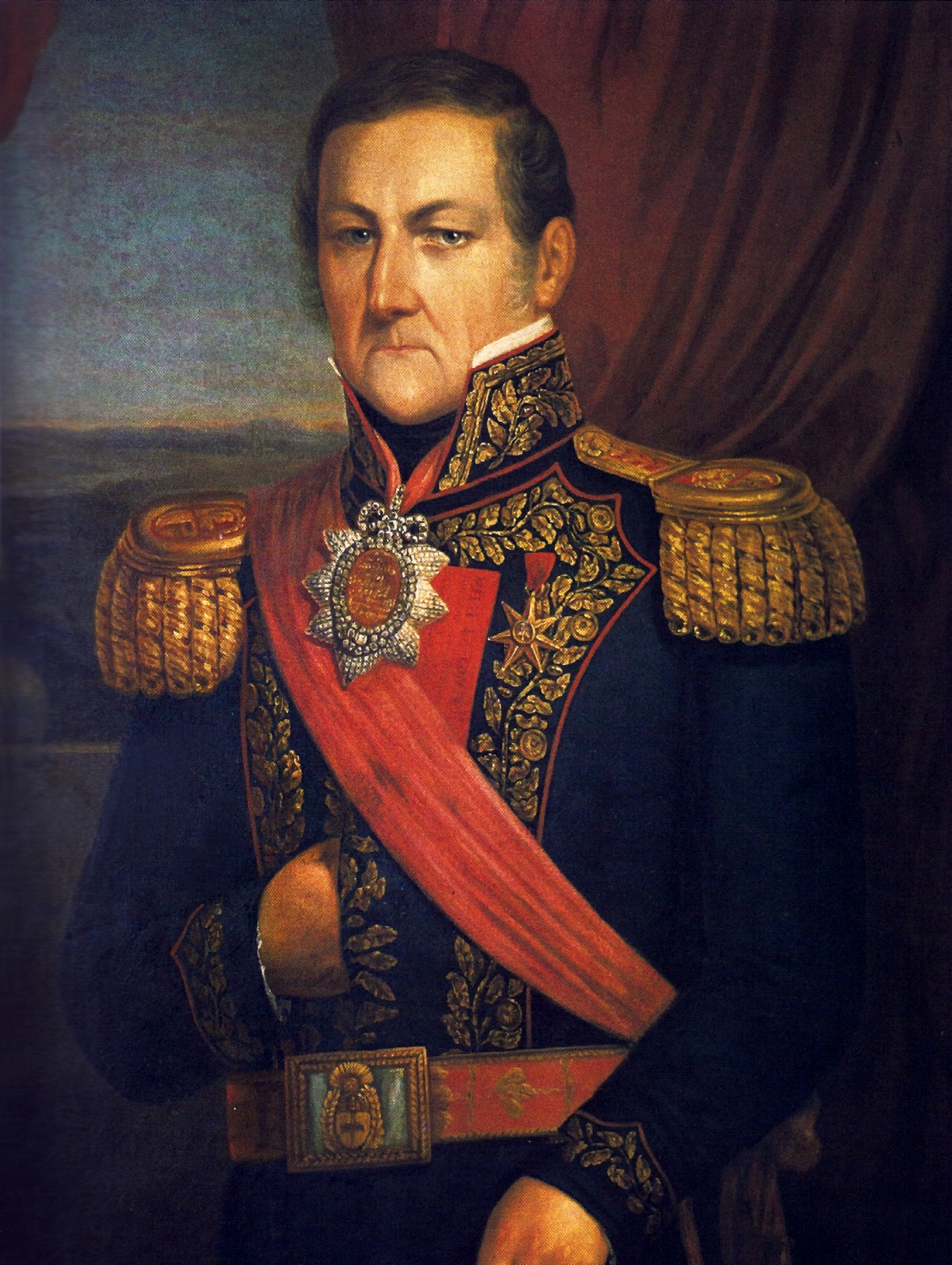Juan Manuel de Rosas
 Juan Manuel José Domingo Ortiz de Rozas y López de Osornio (30 March 1793 – 14 March 1877), nicknamed "Restorer of the Laws", After the Desert Campaign he was called the "Conqueror of the desert" (''Conquistador del desierto''). As his dictatorship became more repressive, Rosas became known as the "Tiger of Palermo", after his main residence in Palermo, then located outside the town of Buenos Aires.}} was an Argentine politician and army officer who ruled Buenos Aires Province and briefly the Argentine Confederation. Born into a wealthy family, Rosas independently amassed a personal fortune, acquiring large tracts of land in the process. Rosas enlisted his workers in a private militia, as was common for rural proprietors, and took part in the disputes that led to numerous civil wars in his country. Victorious in warfare, personally influential, and with vast landholdings and a loyal private army, Rosas became a caudillo, as provincial warlords in the region were known. He eventually reached the rank of brigadier general, the highest in the Argentine Army, and became the undisputed leader of the Federalist Party.
Juan Manuel José Domingo Ortiz de Rozas y López de Osornio (30 March 1793 – 14 March 1877), nicknamed "Restorer of the Laws", After the Desert Campaign he was called the "Conqueror of the desert" (''Conquistador del desierto''). As his dictatorship became more repressive, Rosas became known as the "Tiger of Palermo", after his main residence in Palermo, then located outside the town of Buenos Aires.}} was an Argentine politician and army officer who ruled Buenos Aires Province and briefly the Argentine Confederation. Born into a wealthy family, Rosas independently amassed a personal fortune, acquiring large tracts of land in the process. Rosas enlisted his workers in a private militia, as was common for rural proprietors, and took part in the disputes that led to numerous civil wars in his country. Victorious in warfare, personally influential, and with vast landholdings and a loyal private army, Rosas became a caudillo, as provincial warlords in the region were known. He eventually reached the rank of brigadier general, the highest in the Argentine Army, and became the undisputed leader of the Federalist Party.In December 1829, Rosas became governor of the province of Buenos Aires and established a dictatorship backed by state terrorism. In 1831, he signed the Federal Pact, recognising provincial autonomy and creating the Argentine Confederation. When his term of office ended in 1832, Rosas departed to the frontier to wage war on the indigenous peoples. After his supporters launched a coup in Buenos Aires, Rosas was asked to return and once again took office as governor. Rosas reestablished his dictatorship and formed the repressive '''', an armed parapolice that killed thousands of citizens. Elections became a farce, and the legislature and judiciary became docile instruments of his will. Rosas created a cult of personality and his regime became totalitarian in nature, with all aspects of society rigidly controlled.
Rosas faced many threats to his power during the late 1830s and early 1840s. He fought a war against the Peru–Bolivian Confederation, endured a blockade by France, faced a revolt in his own province and battled a major rebellion that lasted for years and spread to five northern Argentine provinces. Rosas persevered and extended his influence in the provinces, exercising effective control over them through direct and indirect means. By 1848, he had extended his power beyond the borders of Buenos Aires and was ruler of all of Argentina. Rosas also attempted to annex the neighbouring nations of Uruguay and Paraguay. France and Great Britain jointly retaliated against Argentine expansionism, blockading Buenos Aires for most of the late 1840s, but were unable to halt Rosas, whose prestige was greatly enhanced by his string of successes.
When the Empire of Brazil began aiding Uruguay in its struggle against Argentina, Rosas declared war in August 1851, starting the Platine War. This short conflict ended with Rosas being defeated and exiled to Britain. His last years were spent in exile as a tenant farmer until his death in 1877. Rosas garnered an enduring public perception among Argentines as a brutal tyrant. Since the 1930s, an authoritarian, antisemitic and racist political movement in Argentina known as ''Nacionalismo'' attempted to improve Rosas' reputation and establish a new dictatorship in the model of his regime. In 1989, his remains were repatriated by the government in an attempt to promote national unity, seeking to rehabilitate Rosas and pardon military personnel convicted of human rights abuses. Rosas remains a controversial figure in Argentina in the 21st century; he was represented on the 20 Argentine peso bill until 2017. Provided by Wikipedia
1
by Rosas, Juan Manuel de, 1793-1877
Published 1970
Subjects: ';
“...Rosas, Juan Manuel de 1793-1877...”Published 1970
Book
2